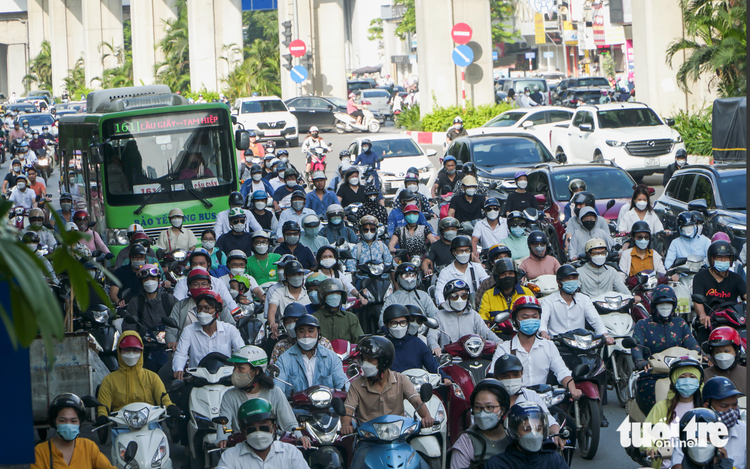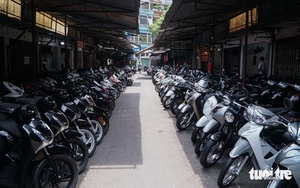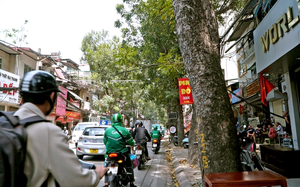
Vehicles crowd a street in Hanoi. Photo: Pham Tuan / Tuoi Tre
The construction department took over transportation oversight following a merger with the former transport department.
Its report, submitted to the Hanoi People’s Committee, highlights multiple barriers to the city’s transition toward clean transportation, including the lack of national technical standards for charging stations, limited power grid capacity, and unclear land use regulations.
The push comes as petrol-powered motorcycles will be banned from the city’s inner Ring Road No. 1 starting July 1, 2026, under a directive from the prime minister aimed at reducing emissions and promoting cleaner transport.
Currently, there is no unified set of technical regulations governing EV charging stations in Vietnam, which hampers interoperability among different manufacturers and service providers, the department said.
Electric bus infrastructure remains limited, with only 113 chargers installed across 16 routes at depots operated by five of the city’s 11 bus companies.
Buses cannot use chargers installed by Vinbus, an electric bus operator backed by Vietnam’s largest private conglomerate Vingroup, for other vehicle types owing to system incompatibility, it added.
“The absence of a master plan for EV charging infrastructure and electricity network capacity has restricted project deployment,” the report said, noting that the expansion of both public and private EV usage would be affected without detailed planning on power supply and grid upgrades.
Hanoi also faces challenges in allocating land for charging station development, particularly in dense urban wards.
Some public areas, such as sidewalks, lack clear legal guidance on whether charging stations can be installed.
Although charging stations are classified as energy infrastructure under construction laws, the process of obtaining permits is complicated by unclear land zoning categories, the department said.
In older residential areas, especially aging apartment buildings, the existing electrical systems are inadequate to support the installation of high-capacity EV chargers.
The department also cited concerns about the high upfront cost of electric vehicles and charging infrastructure, which is discouraging adoption among transport operators and residents.
Public awareness of clean vehicles remains modest, especially in suburban communes and wards, it said.
On Tuesday, the Department of Construction hosted a meeting to discuss proposed policy mechanisms for supporting EV infrastructure.
It has requested the municipal government to review and approve a draft resolution on clean energy transport incentives, as well as a broader scheme to phase out fossil fuel vehicles in favor of electric and environmentally friendly alternatives.
It also called on relevant agencies to issue formal feedback on regulatory obstacles and policy proposals, so it can finalize the draft resolution for submission to the People’s Council for approval.




Max: 1500 characters
There are no comments yet. Be the first to comment.